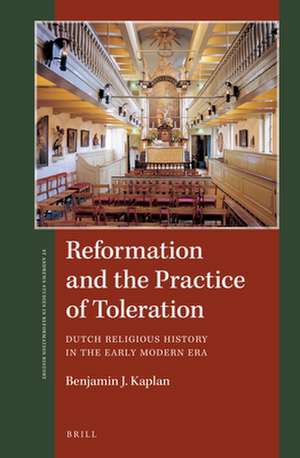Reformation and the Practice of Toleration: Dutch Religious History in the Early Modern Era: St Andrews Studies in Reformation History
Autor Benjamin J. Kaplanen Limba Engleză Hardback – 18 sep 2019
Din seria St Andrews Studies in Reformation History
- 15%
 Preț: 695.67 lei
Preț: 695.67 lei -
 Preț: 311.51 lei
Preț: 311.51 lei -
 Preț: 288.80 lei
Preț: 288.80 lei -
 Preț: 313.38 lei
Preț: 313.38 lei - 23%
 Preț: 947.93 lei
Preț: 947.93 lei - 25%
 Preț: 772.07 lei
Preț: 772.07 lei - 18%
 Preț: 1054.71 lei
Preț: 1054.71 lei - 18%
 Preț: 1000.27 lei
Preț: 1000.27 lei - 25%
 Preț: 880.05 lei
Preț: 880.05 lei - 25%
 Preț: 768.30 lei
Preț: 768.30 lei - 15%
 Preț: 240.92 lei
Preț: 240.92 lei - 26%
 Preț: 822.34 lei
Preț: 822.34 lei - 18%
 Preț: 1000.27 lei
Preț: 1000.27 lei - 26%
 Preț: 765.43 lei
Preț: 765.43 lei - 25%
 Preț: 766.66 lei
Preț: 766.66 lei - 18%
 Preț: 1000.27 lei
Preț: 1000.27 lei - 25%
 Preț: 498.88 lei
Preț: 498.88 lei - 18%
 Preț: 1053.16 lei
Preț: 1053.16 lei - 25%
 Preț: 767.88 lei
Preț: 767.88 lei - 18%
 Preț: 1054.71 lei
Preț: 1054.71 lei - 26%
 Preț: 764.87 lei
Preț: 764.87 lei - 18%
 Preț: 1062.62 lei
Preț: 1062.62 lei - 18%
 Preț: 1005.01 lei
Preț: 1005.01 lei - 25%
 Preț: 768.82 lei
Preț: 768.82 lei - 26%
 Preț: 765.19 lei
Preț: 765.19 lei - 18%
 Preț: 1062.98 lei
Preț: 1062.98 lei - 26%
 Preț: 764.20 lei
Preț: 764.20 lei - 25%
 Preț: 769.55 lei
Preț: 769.55 lei - 25%
 Preț: 768.30 lei
Preț: 768.30 lei - 25%
 Preț: 770.31 lei
Preț: 770.31 lei -
 Preț: 349.80 lei
Preț: 349.80 lei - 26%
 Preț: 765.84 lei
Preț: 765.84 lei - 26%
 Preț: 765.84 lei
Preț: 765.84 lei - 18%
 Preț: 1004.20 lei
Preț: 1004.20 lei - 25%
 Preț: 496.94 lei
Preț: 496.94 lei - 18%
 Preț: 1001.84 lei
Preț: 1001.84 lei - 25%
 Preț: 770.62 lei
Preț: 770.62 lei - 25%
 Preț: 739.65 lei
Preț: 739.65 lei - 25%
 Preț: 772.76 lei
Preț: 772.76 lei - 25%
 Preț: 767.47 lei
Preț: 767.47 lei - 18%
 Preț: 1072.08 lei
Preț: 1072.08 lei - 18%
 Preț: 1057.09 lei
Preț: 1057.09 lei - 26%
 Preț: 765.01 lei
Preț: 765.01 lei - 26%
 Preț: 764.20 lei
Preț: 764.20 lei - 18%
 Preț: 1008.97 lei
Preț: 1008.97 lei - 25%
 Preț: 768.46 lei
Preț: 768.46 lei - 26%
 Preț: 763.39 lei
Preț: 763.39 lei -
 Preț: 376.48 lei
Preț: 376.48 lei
Preț: 709.25 lei
Preț vechi: 864.94 lei
-18% Nou
Puncte Express: 1064
Preț estimativ în valută:
135.78€ • 141.67$ • 113.82£
135.78€ • 141.67$ • 113.82£
Carte indisponibilă temporar
Doresc să fiu notificat când acest titlu va fi disponibil:
Se trimite...
Preluare comenzi: 021 569.72.76
Specificații
ISBN-13: 9789004353947
ISBN-10: 9004353941
Dimensiuni: 155 x 235 mm
Greutate: 0.75 kg
Editura: Brill
Colecția Brill
Seria St Andrews Studies in Reformation History
ISBN-10: 9004353941
Dimensiuni: 155 x 235 mm
Greutate: 0.75 kg
Editura: Brill
Colecția Brill
Seria St Andrews Studies in Reformation History
Notă biografică
Benjamin J. Kaplan (Ph.D. Harvard, 1989) holds the Chair in Dutch History at University College London. The author of several prize-winning books, he writes chiefly on the history of religious toleration in the Netherlands and elsewhere in early modern Europe.
Cuprins
Acknowledgements
List of Illustrations
Abbreviations
Introduction
1 “Remnants of the Papal Yoke”: Apathy and Opposition in the Dutch Reformation
2 Hubert Duifhuis and the Nature of Dutch Libertinism
3 Dutch Particularism and the Calvinist Quest for “Holy Uniformity”
4 Confessionalism and Its Limits: Religion in Utrecht, 1600–1650
5 A Clash of Values: The Survival of Utrecht’s Confraternities after the Reformation and the Debate over their Dissolution
6 Possessed by the Devil? A Very Public Dispute in Utrecht
7 Fictions of Privacy: House Chapels and the Spatial Accommodation of Religious Dissent in Early Modern Europe
8 “Dutch” Religious Tolerance: Celebration and Revision
9 Muslims in the Dutch Golden Age: Representations and Realities of Religious Toleration
10“In equality and enjoying the same favour”: Biconfessionalism in the Low Countries
11Religious Encounters in the Borderlands of Early Modern Europe: The Case of Vaals
12“For They Will Turn Away Thy Sons”: The Practice and Perils of Mixed Marriage in the Dutch Golden Age
13Integration vs. Segregation: Religiously Mixed Marriage and the “Verzuiling” Model of Dutch Society
14Intimate Negotiations: Husbands and Wives of Opposing Faiths in Eighteenth-Century Holland
Index
List of Illustrations
Abbreviations
Introduction
1 “Remnants of the Papal Yoke”: Apathy and Opposition in the Dutch Reformation
2 Hubert Duifhuis and the Nature of Dutch Libertinism
3 Dutch Particularism and the Calvinist Quest for “Holy Uniformity”
4 Confessionalism and Its Limits: Religion in Utrecht, 1600–1650
5 A Clash of Values: The Survival of Utrecht’s Confraternities after the Reformation and the Debate over their Dissolution
6 Possessed by the Devil? A Very Public Dispute in Utrecht
7 Fictions of Privacy: House Chapels and the Spatial Accommodation of Religious Dissent in Early Modern Europe
8 “Dutch” Religious Tolerance: Celebration and Revision
9 Muslims in the Dutch Golden Age: Representations and Realities of Religious Toleration
10“In equality and enjoying the same favour”: Biconfessionalism in the Low Countries
11Religious Encounters in the Borderlands of Early Modern Europe: The Case of Vaals
12“For They Will Turn Away Thy Sons”: The Practice and Perils of Mixed Marriage in the Dutch Golden Age
13Integration vs. Segregation: Religiously Mixed Marriage and the “Verzuiling” Model of Dutch Society
14Intimate Negotiations: Husbands and Wives of Opposing Faiths in Eighteenth-Century Holland
Index
